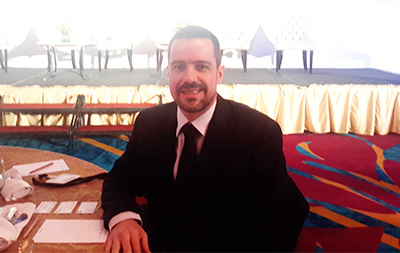Monsanto Philippines: Vision and actions of a responsible business partner in agriculture

Can you briefly highlight Monsanto’s business in the Philippines?
Helping farmers to produce more, conserve more and improve lives - that’s our belief not only in the Philippines but all over the world. In the Philippines, our key business is corn, vegetable and roundup herbicide which can be used in many crops. Here we have 10 to 12 seeds companies in the Philippines and Monsanto is one of the major players here.
Corn is our key focus here because we can provide more impact on that in the Philippines. Here in the country we have 2.3 million hectare of corn and 1.5 million corn farmers according to Philippines Bureau of Agricultural Statistics (BAS). After a decade of bringing biotechnology corn to the Philippines, we are very happy to see that farmers can proactively increase their corn yield, the country starts to become self-efficient in corn, and the Philippines even export corn to other countries starting from 2012.
Monsanto Philippines has won the Sustainable Business Awards (SBA) under the category Workplace Practices, hasn’t it?
The SBA recognises best practices and leadership in sustainable business among national and multinational companies in the Philippines. We are very pleased to have received this award. It is a validation that our sincere efforts to provide a safe and engaging work environment for our staff have been successful.
The Vietnamese government as well as other ASEAN countries are still very prudent with GM crops while the government of the Philippines approved the commercialisation of GM corn more than a decade ago. How can Vietnam learn from the Philippines?
I heard a lot of good news about Vietnam recently. It is a possibility that the Vietnamese government will officially approve the mass adoption of GM corn in the country in 2015. That would be a huge opportunity for the local farmers to access to the technology that can help them to increase yield and income.
As I mentioned earlier in the discussion, we can not expand land but we have to expand productivity. How can we do it? We believe that no single approach to that question and biotechnology is just one of the solutions. To bring the solution to reality, be it biotechnology or anything else, it requires a lot of efforts and collaboration from many different institutions in the sector.
In agriculture, the first and most important thing you need to do is put farmer at the centre – everything must benefit farmers. From our experience, we started to work with the Farmer Association in demonstrating the benefit of GM crops to their farms first. When farmers experience the benefit of biotechnology crops and voice out their needs, the government will take it into their consideration.
Furthermore, it is also crucial to have a science-based approach. In the Philippines, we are very lucky to have a strong science-based determination from the government and proactive science community. Those are the key factors that help Filipino farmers become the first one in the Southeast Asia region access to the advanced technology that brought them significant benefits.
What are the benefits of GM crops to the Philippines since 2002?
From 2002 to 2012, the yield per hectare increased by 45 per cent. Another study by Gonzales stated that biotechnology corn could provide an overall income advantage of 5 per cent to 14 per cent during wet season and 20 per cent to 48 per cent during the dry season. The application of biotechnology corn had brought $400 million income to Bt and Ht corn farmers in the Philippines from 2002 to 2012. In 2013 alone, a sum of $93 million was generated by biotechnology corn.
Drought is said to be one of the most drastic climate change impacts worldwide. Has Monsanto conducted any study in developing drought-tolerant hybrids?
Globally speaking we have. We have a global team working in this. In 2013 Monsanto launched the first transgenic drought tolerance trait in a line of corn hybrids called DroughtGard in the US. The timeline of commercialising this product will depend on the needs and the approval timeline of specific markets. At Monsanto, investing in research and development to create better hybrids and practices to mitigate the severe climate changes is our top focus. There are critical needs to mitigate climate changes all around the world. One more point that I want to emphasise is we should be very specific in combining technologies and techniques. In the Philippines, we have 16 to 20 typhoons a year. What we can help is to provide suitable technique and instruction to farmers on how and when to plant to avoid the typhoons or minimise the loss even when the typhoon arrives. In addition to breeding, biotechnology, technology transfers and other services such as extension, agronomic training are as important to help farmers produce more under severe conditions.
What the stars mean:
★ Poor ★ ★ Promising ★★★ Good ★★★★ Very good ★★★★★ Exceptional
Latest News
More News
- Businesses ramp up production as year-end orders surge (December 30, 2025 | 10:05)
- Vietjet chairwoman awarded Labour Hero title (December 29, 2025 | 13:06)
- How to unlock ESG value through green innovation (December 29, 2025 | 10:03)
- AI reshapes media and advertising industry (December 29, 2025 | 08:33)
- FPT and GELEX sign deal to develop blockchain tech for global markets (December 29, 2025 | 08:29)
- Vietnam’s GDP forecast to grow by 9 per cent in 2026 (December 29, 2025 | 08:29)
- Women entrepreneurs are key to Vietnam’s economic growth (December 29, 2025 | 08:00)
- Vietnam's top 500 value-creating enterprises announced (December 27, 2025 | 08:00)
- The PAN Group shaping a better future with ESG strategy (December 26, 2025 | 09:00)
- Masan Consumer officially lists on HSX, marking the next phase of value creation (December 25, 2025 | 13:20)















 Mobile Version
Mobile Version